John Deere Mowers and Trailers in Agriculture

Overview of the Topic
Definition and Importance
In the ever-evolving landscape of agriculture, the tools we use can significantly influence productivity and sustainability. John Deere mowers and trailers have become synonymous with quality and efficiency in farming. These machines serve a vital purpose, allowing farmers to maintain their land, harvest crops, and transport goods with ease.
Mowers play a pivotal role not only in maintaining crops but also in enhancing the aesthetic appeal of farmland, ensuring healthy growth of plants. Trailers, on the other hand, support logistics by transporting harvested items, fertilizers, and equipment across different parts of the farm. Simply put, these tools are the backbone of modern farming practices, intertwining tradition with technology.
Current Trends
Modern agriculture faces a slew of challenges, including labor shortages, climate change, and fluctuating market demands. To address these, farmers are increasingly turning to advanced technologies integrated into John Deere machineries. This includes GPS-guided systems, performance monitoring, and automated functionalities that greatly enhance operational efficiency.
One notable trend is the push towards sustainability. Farmers are now more inclined to choose equipment designed for low fuel consumption and reduced emissions. Additionally, with growing interest in precision agriculture, mowers and trailers are being developed to cater specifically to the unique demands of varying soil and crop conditions. The integration of IoT technology into these tools allows for data collection and analysis, which helps farmers make informed decisions, optimize resources, and improve crop yield.
"The adoption of technology in farming not only boosts productivity but also paves the way for environmentally responsible practices that can support our planet for generations to come."
Key Techniques and Practices
Step-by-Step Guide
Understanding the effective use of John Deere mowers and trailers involves learning their specific applications in agricultural processes. Here’s a simple guide:
- Assess your needs: Insert the specific crop type and land characteristics when deciding on the model.
- Select the right equipment: Choose mowers based on factors such as cutting width and power requirements. Trailers should be judged based on load capacity and durability.
- Regular maintenance: Ensure your equipment is serviced regularly. This includes oil changes, blade sharpening, and checking tire pressure.
- Utilize technology: Take advantage of the built-in tech features. Monitor performance through available apps, ensuring optimal usage.
- Practice efficient workflow: Create a plan for how and when to use these tools during planting and harvesting seasons.
Tools and Equipment Needed
While John Deere provides mowers and trailers, think about additional tools that can complement these essential pieces. Some items include:
- Tractors: To tow trailers and facilitate mowing.
- Maintenance Kits: For upkeep of equipment, ensuring longevity and reliability.
- GPS Equipment: To assist in precision farming operations.
- Safety Gear: Essential for operator protection during equipment use.
Challenges and Solutions
Common Obstacles
No agriculture tool comes without its challenges. For John Deere products, some common obstacles faced by farmers include:
- High Initial Investment: The cost of purchasing mowers and trailers can be daunting for small-scale farmers.
- Maintenance Needs: Regular upkeep can be a bit labor-intensive, especially for those unfamiliar with mechanical work.
- Learning Curve: As in any tech-driven transformation, there’s a learning curve, especially for farmers not accustomed to modern machinery.
Innovative Solutions
Fortunately, there are ways to address these challenges. Solutions include:
- Leasing Options: Many dealers offer leasing programs which can ease the financial burden.
- Online Learning Platforms: To help farmers become well-versed in operating and maintaining equipment.
- Community Support: Connecting with local farming groups or online forums like reddit.com can provide valuable tips and shared experiences.
Taking the plunge into the world of John Deere mowers and trailers may seem daunting, but understanding their features, techniques, and the potential roadblocks can empower farmers to make sound decisions that benefit their operations. Stay tuned as we explore more about the maintenance routines and tech integrations that enhance these powerful agricultural tools.
Preamble to John Deere Products
In the grand scheme of modern agriculture, John Deere products are more than mere tools; they embody a legacy of innovation and efficiency. As we navigate through various aspects of mowers and trailers designed for diverse farming needs, it's crucial to grasp why John Deere stands as a pillar in this industry. Their equipment does not just perform tasks; it revolutionizes the way farming is perceived and executed, increasing productivity while promising reliability.
To truly appreciate the impact of John Deere, let's reflect upon its rich history and core values. These foundation stones have influenced the design and functionality of their products, ultimately guiding farmers and enthusiasts in making informed choices.
Historical Overview of the Brand
Since its inception in the mid-1800s, John Deere has undergone transformative evolution, cementing its place as a leader in agricultural machinery. Founded by John Deere, a blacksmith, the brand started with the simple yet revolutionary self-scouring plow, an invention that marked a shift in farming practices. This innovation allowed farmers to till the fertile soil of the American Midwest with unprecedented ease.
As decades rolled on, John Deere expanded its product range significantly. The jump from traditional plows to advanced tractors and mowers seems almost miraculous, yet it speaks volumes about the brand's commitment to meeting the demands of a changing agricultural landscape. By continuously adapting to technological advancements while maintaining focus on user experience, the company has built not only machines but a community of devoted users.
Core Values and Mission
At the heart of John Deere's operations is a well-defined mission that resonates with its customers. Their core values stress integrity, quality, commitment, and innovation. The company is dedicated to providing solutions that address the real-life challenges farmers face daily.
This commitment is evident in every John Deere product. The emphasis on sustainable practices, efficiency, and advancements in technology reflects a thoughtful approach to today's pressing agricultural issues. For example, the integration of precision agriculture enables farmers not just to work harder, but smarter, balancing productivity with environmental stewardship.
In summary, understanding John Deere is more than knowing about the physical machinery. It's about recognizing the foundational principles and forward-thinking innovations that define their products. As we delve deeper into mowers and trailers, the essence of John Deere will continue to illuminate how these tools significantly enhance modern agricultural practices.
Understanding Mowers: A Comprehensive Guide
When diving into modern agriculture, understanding how John Deere mowers fit into the picture is essential. These mowers do more than just groom the landscape; they play a critical role in efficient land management. With the right mower, farmers can save time and resources, allowing for effective management of both crops and grounds. Moreover, mowers come equipped with various features suitable for the diverse needs observed in agricultural settings today, ensuring that every type of user, from the hobbyist to the large-scale farmer, finds something that meets their specific requirements.
Types of John Deere Mowers
Riding Mowers
Riding mowers are a practical choice for those with larger lawns or fields. Unlike smaller push mowers, riding mowers allow the user to sit comfortably while navigating the terrain. This can lead to significant reductions in fatigue during long mowing sessions. A key characteristic of riding mowers is their large cutting decks, which cover more ground in less time. Their ability to maneuver around obstacles smoothly is an added benefit for users working in uneven or intricate layouts.
One unique feature of riding mowers is the ability to attach various accessories, such as baggers for grass collection and mulch kits. These optional attachments enhance the mower's versatility, turning it into a multi-functional tool for not just mowing but other lawn care tasks as well. However, they can come at a higher initial cost and may require more maintenance compared to push mowers.
Lawn Tractors
Lawn tractors often serve as the middle ground between riding mowers and more robust garden tractors. They typically have a slightly higher horsepower, making them capable of more demanding tasks like pulling heavier loads or larger implements. Their lower center of gravity lends stability during operation, which is particularly helpful on slopey terrains.
The standout feature of lawn tractors is their ease of use and versatility. They can handle a variety of attachments, including snow blades and seeders, allowing farmers to leverage their tractors throughout the year. But while their adaptability makes them appealing, lawn tractors usually have a more limited cutting width compared to larger, commercial-grade riding mowers.
Zero-Turn Mowers
Zero-turn mowers represent a leap in mowing technology. Designed primarily for commercial use, they feature a unique design which allows for a 180-degree turn radius. This capability enables operators to trim around trees and flower beds with precision, minimizing uncut patches that might otherwise be a hassle. Their agility is a noteworthy aspect that appeals to professional landscapers and rigorous agricultural operations.
Moreover, zero-turn mowers stand out with powerful engines, which not only improve cutting speed but also enhance efficiency with fuel consumption. However, they might be overkill for smaller properties, and their complexity can put off novice users who are just getting into DIY lawn care.
Key Features and Specifications
Engine Performance
While mowers might appear similar from the outside, engine performance is where the magic happens. The engine's horsepower directly influences both the mower's cutting ability and its overall efficiency. Higher horsepower often leads to faster cutting speeds, allowing for more productivity in less time. John Deere mowers come with a variety of engine options; some are designed for flat terrains while others are optimized for hilly landscapes.
The unique feature here lies in the mowers that combine both performance and fuel efficiency in their engine design. These mowers can provide robust power without hefty fuel costs, making them particularly attractive in today’s economy, especially for those who spend countless hours mowing.
Cutting Width and Deck Design
Cutting width and deck design is another crucial consideration when selecting a mower. Mowers come in varying widths, typically measured in inches, determining how much grass can be cut at once. Wider decks generally allow for quicker mowing, ideal for larger areas, while narrower decks can offer more precision in tighter spaces.
John Deere's engineering focuses on creating decks that not only cut efficiently but are also designed for durability. Their innovative designs help in grass dispersal, preventing clumping and enabling a cleaner finish. However, a wider deck can present challenges when navigating tight corners or landscaping details, so it might not suit every user's needs.
Fuel Efficiency
Fuel efficiency is a consideration that cannot be ignored, especially in an era of rising fuel prices. Mowers that maximize fuel efficiency can ultimately lead to substantial cost savings over time. John Deere has made strides in this aspect by incorporating advanced engine technologies that render lesser fuel consumption while maintaining optimal performance levels.
A notable feature of fuel-efficient mowers includes their ability to adapt engine performance based on the load. This can prolong the lifespan of the mower and reduce unnecessary wear and tear through smarter throttle usage. While initial investment in these technologies might be higher, the long-term rewards in operational savings are often justifiable.
Exploring Trailers: Functions and Importance
Trailers play a crucial role in modern agriculture, acting as the trusty workhorses that transport essential materials and equipment across fields and farms. Their importance can’t be overstated when it comes to improving efficiencies and effectiveness in day-to-day agricultural operations. John Deere trailers are designed not just to haul loads but also to enhance productivity through innovative features and durable construction. Since agriculture demands adaptability, having versatile trailers at hand allows farmers to respond swiftly to the changing landscapes of their working environment. By exploring this section, readers will gain a clear understanding of the various types of trailers available and the specific functions that make them indispensable in current agricultural practices.
Types of Trailers for Agricultural Use
Utility Trailers
Utility trailers are the jack-of-all-trades in agricultural settings. They are primarily used for transporting equipment, tools, and small loads, which makes them an excellent choice for small to medium-sized farms. These trailers are characterized by their open design and versatile applications. One of their standout features is their lightweight frame, which allows farmers to haul supplies without overwhelming their towing vehicle. This flexibility makes them a popular pick for anyone—from hobbyists with a few acres to larger operations needing the added functionality to move fertilizers or tools around seamlessly.
However, it's important to note that while utility trailers shine in versatility, they do have limitations in terms of weather protection and load security.
Dump Trailers
Dump trailers stand as heavy-duty companions on any agricultural site. They're primarily designed for transporting bulk materials like soil, gravel, or compost. The tilting mechanism that allows for easy unloading is their key feature, dramatically saving time and effort compared to manual unloading methods.
The advantage of dump trailers lies in their high weight capacity and durability, making them ideal for demanding tasks. They can carry numerous loads, which is a godsend during growing seasons. On the flip side, their heavier construction might limit their usage in smaller farms where such capacity isn’t always necessary.
Enclosed Trailers
Enclosed trailers are the fortresses of the trailer world, providing protection for valuable cargo from the elements and theft. This type of trailer allows farmers to transport equipment safely without exposing it to harsh conditions. One of their notable features is their locking equipment, which ensures peace of mind while on the road or left unattended.
Enclosed trailers can be a smart investment, especially for those transporting sensitive materials or expensive machinery. However, one should consider that these trailers can be heavier and might not be as agile as their open counterparts in tight agricultural spaces.
Features that Enhance Connectivity and Efficiency
Weight Capacity

Weight capacity is critical when selecting a trailer. A higher weight limit enables farmers to haul larger loads, significantly reducing the number of trips needed to transport goods. This efficiency becomes evident during peak seasons when every minute counts. Choosing trailers with higher weight capacities means less downtime and more face-time with crops.
However, it’s crucial to ensure that the towing vehicle is compatible with the weight limits of the trailer to avoid any accidents. Overloading can put undue stress on the vehicle, causing mechanical failures.
Material Durability
When it comes to trailers, the materials they’re made from can make or break their longevity. Steel and aluminum are common, each offering unique benefits. Steel generally provides more strength while aluminum is lighter and resistant to rust.
Choosing a trailer with robust material construction translates into less maintenance and fewer replacements over time, which is a financial win for any farmer. But keep in mind that lighter trailers might be more susceptible to dents in rocky terrains or harsh environments.
Ease of Attachment
Farming often involves switching between different tools and trailers. A trailer that allows for an easy attachment can save time and effort, letting farmers focus more on the task at hand rather than fiddling with complicated couplings. A more straightforward attachment system helps to ensure that every transition is quick and efficient, which is essential during busy farming days.
Nevertheless, one should always check compatibility with their towing vehicle to ensure smooth operation.
In summary, trailers are a vital component in modern agriculture that can significantly influence productivity and operational efficiency. By carefully evaluating the types and features of trailers, farmers can make informed decisions that align with their specific needs.
Advantages of Using John Deere Equipment
John Deere mowers and trailers provide a well-rounded set of benefits that go beyond mere equipment ownership. For farmers and agricultural enthusiasts, these tools represent not just machinery, but a synergy between tradition and forward-thinking designs. Investing in John Deere is often seen as a way to enhance operational outcomes, which in turn leads to increased productivity and smoother day-to-day functioning. Let's break down some of the key advantages that these products bring to the table.
Increase in Productivity and Efficiency
When it comes to productivity, John Deere's reputation stands up to scrutiny. One way they achieve this is by integrating performance-driven features into their mowers and trailers. For instance, take the cutting decks on their mowers. With a cutting width that often far exceeds many competitors, users can finish larger areas more quickly. This effectiveness is incredibly helpful during peak farming seasons when every minute counts.
Moreover, fuel efficiency is another ace up its sleeve. Utilizing advanced engine technology, John Deere equipment tends to maximize fuel use, translating into lower operating costs. The less farmers need to spend on fuel, the more they can allocate toward other important areas of their operation. Investing in such technologies can pay dividends in the long run, keeping both productivity high and expenses manageable.
The right equipment can turn a long day's work into a breeze, ensuring you're not just going through the motions, but you're getting things done.
Enhanced User Experience and Comfort
Long hours spent operating field equipment can take a toll, both mentally and physically. John Deere places significant emphasis on the user experience, which often translates into more comfortable machinery. For example, features like adjustable seats and ergonomic controls allow operators to maintain a more natural posture while working. This reduces fatigue over time and can lead to greater focus when it matters most.
Furthermore, the noise levels in John Deere products are generally minimized, allowing operators to work in a more pleasant sound environment. This is a significant consideration, especially for jobs that stretch over many hours. A slight hum of the machine is far less distracting than loud engine roars, contributing to a more enjoyable workday.
Long-Term Investment Benefits
John Deere equipment often aligns itself with qualities of endurance and resilience. Farmers aren’t just looking for tools to get them through a season; they want machinery that stands the test of time. That’s why many consider John Deere a long-term investment. The durability of their mowers and trailers can often save farmers from costly repairs and replacements as the years go by. With proper care, such machines can last decades.
Moreover, resale value for John Deere machinery tends to remain strong, which can be an attractive factor if an operator wishes to upgrade machinery down the line. When you invest in something that holds value, it's a win-win scenario. It’s not just about what they can do today; it’s about what they might still bring to the table years from now.
In the realm of agriculture, choosing John Deere means you're signing up not just for present productivity but future potential as well.
Maintenance and Care for Optimal Performance
Maintaining your John Deere mowers and trailers is crucial to achieving their optimal performance. Regular care not only extends the lifespan of your machinery but also ensures they operate at peak efficiency. Without proper maintenance, even the best equipment can fall short, leading to costly repairs and downtime. Understanding the specific practices needed to keep these machines in tip-top shape can make all the difference for farmers who rely on them daily. So, let’s delve into the essential aspects of maintenance and care.
Routine Maintenance Practices
Oil Changes
Oil changes play a critical role in how well your equipment runs. Fresh oil lubricates the engine, reducing friction and heat build-up. This can help prevent wear and tear on engine components, ultimately leading to better performance. A key characteristic of oil changes is frequency; many farmers find it beneficial to change oil at regular intervals, such as every 50 hours of operation. This not only keeps the engine clean but also enhances efficiency, allowing farmers to focus on their work without worrying about mechanical issues.
One unique aspect of oil changes is the evident difference a clean oil brings. It reduces hazards of overheating and helps in fuel efficiency, which is often a major concern in agricultural settings. Some might say it's a small price to pay for prolonging your machine's life.
Blade Sharpening
Blade sharpening is another essential yet sometimes overlooked aspect of mower maintenance. When blades are sharp, they cut grass cleanly rather than tearing it, which promotes healthier growth. This improves the overall appearance of the lawn or field and also reduces the strain on the machine's engine. The key characteristic of regularly sharpening blades is the noticeable difference in quality of cut, leading to enhanced performance and less time spent on mowing.
One unique feature to consider about blade sharpening is the frequency; depending on use, it might be necessary to sharpen the blades as often as every 8 to 10 hours of operation. Neglecting this simple task could lead to uneven cuts and more frequent repairs down the line.
Filter Replacements
Filter replacements are vital for maintaining air and fuel quality in your equipment. Dirty filters can choke the engine, restricting airflow and performance. Regularly replacing these filters helps ensure that your machinery runs smoothly. A key characteristic that stands out about filter replacements is how they dramatically influence fuel efficiency; cleaner fuel filters lead to better combustion and reduced emissions.
Unique to this practice is the importance of timing. Many farmers find it advantageous to replace filters at the beginning of the season or before heavy usage periods. This means fewer interruptions during crucial times like harvest.
Seasonal Preparation Tips
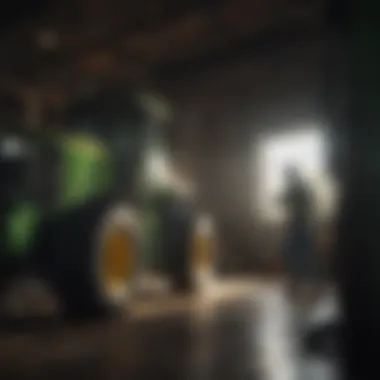

Winter Storage Protocols
When winter rolls around, knowing how to properly store your mowers and trailers is vital. Winter storage protocols ensure that machines don’t succumb to cold weather damage. A good practice is to clean the equipment thoroughly, remove all fuel, and apply a protective coating to prevent rust. The importance of this preparation cannot be overstated; it can mean the difference between equipment that starts in spring and gear that won't budge.
What’s unique about winter storage is not just the physical preparation, but also the peace of mind it brings. Knowing your machines are protected allows farmers to concentrate on other tasks without worrying about equipment failures in the spring.
Pre-Season Checklists
Before the start of a new growing season, having a pre-season checklist can be immensely beneficial. This checklist should include inspection of belts, hoses, and tire pressures. Also, checking fluid levels and battery health can save headaches later on. The importance of having a systematic approach to this step lies in the prevention of unexpected breakdowns just when you need reliable performance the most.
A unique feature of these checklists is their adaptable nature; farmers can tailor them based on their specific operating conditions and equipment. By ensuring all equipment checks out before the busy season, they minimize risks associated with maintenance lapses.
"An ounce of prevention is worth a pound of cure." Performing routine checks can be more valuable than the inevitable breakdowns occurring at the worst possible times.
Technology Integration in John Deere Equipment
In today's fast-paced agricultural landscape, technology plays a crucial role in maximizing efficiency and productivity. John Deere stands out as a leader in integrating advanced technologies into their equipment, thus transforming traditional farming into a more streamlined and data-driven enterprise. The integration of technology into mowers and trailers not only enhances performance but also provides farmers with actionable insights. As the modern farmer grapples with an ever-increasing array of challenges, having smart tools at their disposal becomes more critical than ever.
GPS and Precision Agriculture
GPS technology has revolutionized the way farmers approach land management. With John Deere's GPS systems, users can achieve pinpoint accuracy in their work. This grants the ability to make better-informed decisions about planting, fertilizing, and harvesting—not to mention reducing overlap and minimizing wasted resources.
- Remote Monitoring: GPS allows for real-time tracking of equipment locations and job progress. With this, farmers can coordinate work schedules and optimize labor use more effectively.
- Field Mapping: Creating detailed maps of fields empowers farmers to visualize variability in soil types, moisture levels, and crop health, ultimately leading to more tailored farming strategies.
- Precision Planting: By applying precise GPS coordinates, plant spacing and depth can be optimized, thus maximizing yields and ensuring healthier crops.
A real-life example shows how one local farmer adopted John Deere's GPS technology. Initially, his yields were inconsistent due to untimely planting and over-fertilization. After integrating the GPS systems, he observed a significant appointment in his crop yields within a season. Better planning and resource deployment lead to reduced costs and enhanced productivity.
Telematics for Performance Monitoring
Telematics systems present another significant leap in agricultural technology. John Deere's telematics enable farm operators to monitor every aspect of their equipment remotely. This doesn't just simplify maintenance; it ensures optimal performance across the board.
- Real-Time Data: Access to data regarding machine hours, fuel consumption, and operational efficiency is now just a click away. This can help identify patterns and potential issues before they escalate.
- Predictive Maintenance: By monitoring equipment health metrics, farmers can address minor issues before they become costly breakdowns, reducing downtime and unexpected repairs.
- Optimization: Performance monitoring allows for better decision-making regarding load management, travel paths, and other operational adjustments for increased efficiency.
As an example, a farming cooperative utilizing telematics found a way to reduce fuel costs by 15% over several months. Using data from their John Deere machines, they optimized their routes and minimized idle time.
"Integrating technology into our equipment has helped us not just survive but thrive in today's competitive agriculture landscape."
In summary, the integration of GPS and telematics into John Deere machinery not only propels farming into a new era but also equips farmers with the tools and insights needed for successful operations. As these technologies continue to evolve, they patently demonstrate their potential in enhancing productivity and facilitating smarter resource allocation.
Choosing the Right Mower and Trailer for Your Needs
When it comes to navigating the modern agricultural landscape, selecting the appropriate mower and trailer is crucial. These tools are not just about cutting grass or hauling loads; their efficiency directly influences productivity and, ultimately, profitability. The right choices can mean the difference between a hectic day getting less done compared to a smooth operation where everything feels seamless.
Assessing Land and Operational Requirements
Understanding the specific features of your land and the operational tasks you intend to carry out is the bedrock of making informed decisions. Here are some key points to consider:
- Land Size and Terrain: The dimensions of your property, along with its topography, will dictate what type of mower and trailer you should consider. A steep, hilly landscape might necessitate a zero-turn mower for better maneuverability, while flat, expansive fields might benefit from larger lawn tractors.
- Purpose of Use: Are you primarily maintaining a lawn, or is your focus on large-scale farming? Mowers designed for delicate lawn care will differ significantly from those tailored for fields filled with dense crops. Likewise, trailers come in various types tailored for specific hauling needs, like utility vs. dump trailers.
For instance, if it’s a small family farm you operate, versatility in mowers can be a huge plus. A riding mower that handles both lawns and garden areas can save you from investing in multiple machines. Knowing your landscape helps in identifying these essential elements.
Budgeting for Purchase and Maintenance Costs
Getting a solid grip on your finances before diving into acquisitions can save headaches down the line. Budgeting isn't just about the initial purchase; you have to account for ongoing maintenance and potential upgrades.
- Initial Costs: John Deere products, while sometimes on the pricier side, offer substantial value through durability and efficiency. So, consider your long-term needs. A robust mower might cost more upfront but could outlast cheaper models by years.
- Maintenance Expenses: Mowers and trailers will require upkeep, including oil changes, belt replacements, and occasional repairs, which, if overlooked, can lead to more significant issues down the road. It's wise to set aside a maintenance budget as a safety net.
- Financing Options: Many dealers, including John Deere, offer financing plans that can help stagger the payments. Understanding various options might open doors, allowing you to acquire equipment without immediate large outlays.
So you see, thoughtful budgeting can empower more informed decisions. As they say, "Penny wise, pound foolish." Saving a few bucks now on cheaper models might lead to a world of trouble later!
In summary, choosing the right mower and trailer for your farming needs involves looking closely at the specifics of your land and operations while staying mindful of your budget. These considerations lay the groundwork for an efficient agricultural setup, paving the way for greater productivity and ultimately more successful farming.
Epilogue: The Future of Agricultural Equipment
In considering the trajectory of agricultural equipment, it’s crucial to analyze the significant shifts taking place within the industry. As we move deeper into the 21st century, the role of machinery like John Deere mowers and trailers extends beyond mere functionality; these tools have become pivotal in shaping sustainable methods of farming. The integration of advanced technology, along with sustainable practices, is what sets the groundwork for future progress.
Sustainability Considerations
In today’s agriculture, sustainability isn’t just a buzzword; it’s a necessity. Farmers are increasingly faced with the challenge of producing more with less, leading to innovative practices that not only enhance yield but also protect the environment. John Deere recognizes this imperative by prioritizing designs that reduce emissions and optimize fuel efficiency. For instance, their latest mower models incorporate smaller engines without compromising on power, reflecting a commitment to lowering carbon footprints.
Beyond machinery, sustainability also encompasses the responsible use of resources. For example, with features like precision cutting and smart mowing schedules, John Deere mowers reduce waste and promote a healthier turf. Thoughtful practices such as these align with a larger movement towards environmental stewardship within the farming community.
"The future of farming is about being more efficient and responsible, not just for today but for generations to come."
Future Trends in Mowing and Towing Technology
Looking forward, technological advancements promise to revolutionize mowing and towing operations even further. The use of autonomous vehicles is on the rise, with companies like John Deere leading the way. This helps farmers manage their tasks more effectively, allowing them to focus on larger operational strategies rather than just the day-to-day grind. Imagine a lawn tractor that steers itself around obstacles while maintaining the perfect cutting height; a reality that is closer than many think.
Furthermore, data integration through cloud technologies will allow farmers to make informed decisions based on real-time analytics. Mowers equipped with GPS can now adjust their performance to varying terrains, maintaining consistent output regardless of the conditions. Similarly, trailers linked with monitoring systems can report weight loads and optimize towing capabilities accordingly.
As we step into the future, the agriculture industry will continuously adapt to meet societal needs while pushing the boundaries of innovation. The partnership between human expertise and cutting-edge technology will ensure that farmers are not just equipped to face challenges but are also empowered to thrive in a changing landscape.



